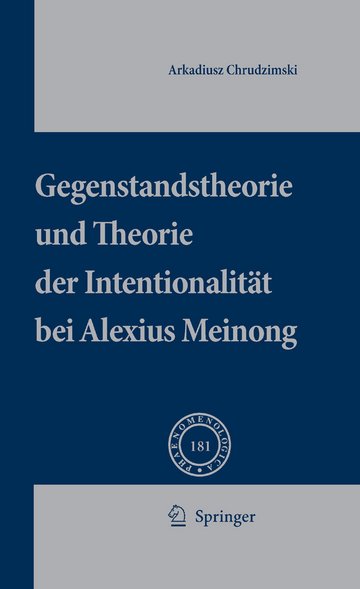Gegenstandstheorie und Theorie der Intentionalität bei Alexius Meinong

| Autor | Arkadiusz Chrudzimski |
|---|---|
| Verlag | Springer-Verlag |
| Erscheinungsjahr | 2007 |
| Seitenanzahl | 393 Seiten |
| ISBN | 9781402055348 |
| Format | |
| Kopierschutz | DRM |
| Geräte | PC/MAC/eReader/Tablet |
| Preis | 139,99 EUR |
Alexius Meinong (1853-1920) nimmt in der Geschichte der Ontologie eine ausgezeichnete Stellung ein. Er war der erste Philosoph, der in systematischer Weise eine quasi-ontologische Disziplin entwickelte, die im Vergleich zu der Disziplin, die man traditionell Metaphysik oder Ontologie nennt, viel allgemeiner sein sollte. Die Metaphysik untersucht das Seiende als Seiendes, und die seienden Entitäten bilden - so die These Meinongs - nur ein kleines Fragment dessen, was man unter dem Namen 'Gegenstandstheorie' untersuchen kann. Die Gegenstände als solche (die 'reinen' Gegenstände) sind, wie Meinong sagt, 'außerseiend', was bedeutet, dass sie bezüglich ihres Seins bzw. Nicht-Seins neutral sein sollen. In diesem Buch wird die so verstandene Gegenstandstheorie in ihrer historischen Entwicklung im Zusammenhang mit Meinongs Intentionalitätstheorie untersucht, denn der wahre Grund, warum Meinong einen Bereich der außerseienden Gegenstände überhaupt postulierte, ist nicht anders als die philosophischen Rätsel, auf die man in der Intentionalitätstheorie stößt.
The thought of Alexius Meinong (1853-1920) has a distinguished position within the conceptual space of ontology. He was the first philosopher who tried systematically to develop a quasi-ontological discipline which was intended to be much more general than the metaphysics in the traditional sense. Metaphysics investigates being qua being; and this constitutes only a small part of the domain of the theory of objects (Gegenstandstheorie) as Meinong conceived of it. For - so reads one of Meinong's most frequently cited theses - the objects considered purely qua objects are neutral concerning their being or non-being. In this book Meinong's theory of objects is presented in its historical development and investigated within the context of his theory of intentionality. This connection is justified because the real motivation behind Meinong's introduction of entities 'beyond being and non being' lies in the philosophical puzzles of the theory of intentionality.




















